Q&A: What does London's China currency deal actually mean?
- Published
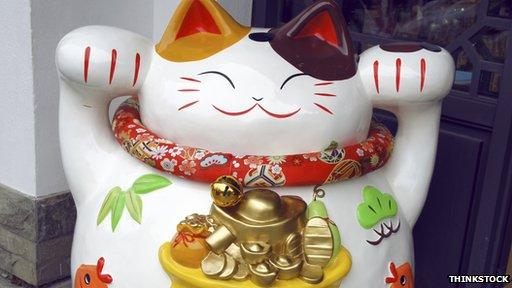
George Osborne thinks the deal will be lucky for the UK
The Bank of England has hailed the appointment of The China Construction Bank as a renminbi clearing house in London as an "important milestone" in the progress toward greater cross-border use of the currency.
And chancellor George Osborne said it was "another major step forward" for the UK as the western hub of Chinese finance.
But what does it actually mean? And what will change as a result of the deal? We answer five key questions.

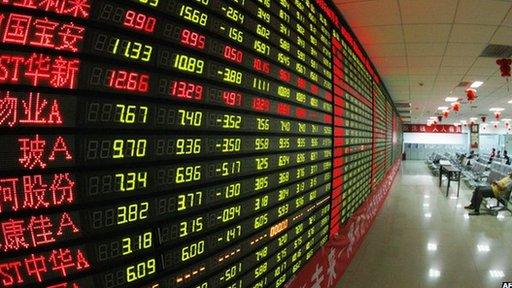
The China and Hong Kong exchanges are to collaborate on a pilot scheme
What is a clearing house anyway?
It's how financial instruments such as shares, bonds and currencies are often traded. A clearing house essentially acts as the middleman between two different parties.
It makes it easier for the trades to take place by removing much of the risk. If one of the parties goes bust mid-transaction then the clearing house steps in to complete it.
To ensure it can do this, the clearing house takes assets from the parties seeking to trade which it uses as collateral for such an event.

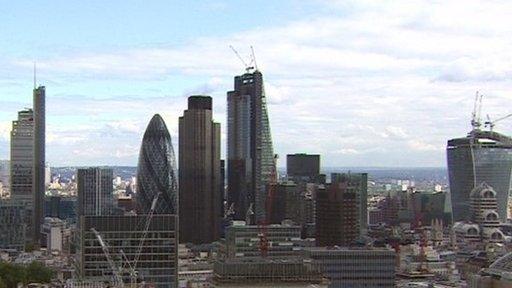
London is already the world's biggest market for global foreign exchange
Why has London been chosen?
"Because it makes sense," says Steven Barrow, head of G10 strategy at Standard Bank.
He points out that London is already the world's biggest market for global foreign exchange, which in total sees some $5 trillion exchanged every day.
London also already accounts for two thirds of all renminbi payments outside of China and Hong Kong, according to George Osborne,
Having a London-based clearing bank means European firms will be able to both make and receive renminbi payments in the western time zone, making such transactions easier, quicker and cheaper.
And choosing London as the base for the first clearing bank outside Asia for the Chinese currency, puts it in pole position to become the leading Western centre for offshore renminbi trading, and ahead of potential rivals such as New York, Paris and Frankfurt.

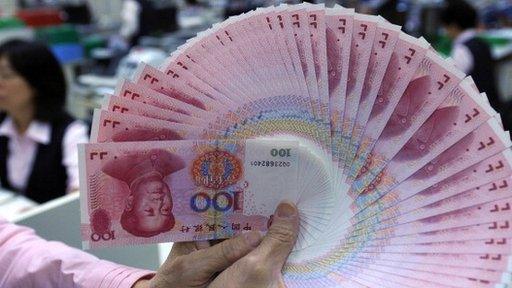
The Bank of England says the deal is an "important milestone"
How will this help the UK?
Initially not a lot. As Mr Barrow says this deal is "evolutionary not revolutionary".
"Imagine going to Spain and not being able to buy euros directly, but instead having to buy dollars and then convert those into euros," says Mr Barrow. "Trading directly will make things a lot easier."
It will also lower transaction costs between the two countries, and Simon Derrick, head of currency research at Bank of New York Mellon, says it should also lead to more deals.
"It will allow Chinese investors to invest elsewhere and mean UK investors can invest more freely in China," he says.
It will also enable the UK to benefit from China's rapidly expanding economic growth. It currently has an 11.5% share of the global export market. Standard Chartered expects this to double in size by 2020, meaning the importance of the renminbi will grow.
Ultimately, this,as Mr Osborne says, should create new jobs and further investment in the UK. "We need to make sure China's currency, as it emerges onto the world stage, is used and traded here as that will not only be good for China, but good for UK jobs and investment too," he says.

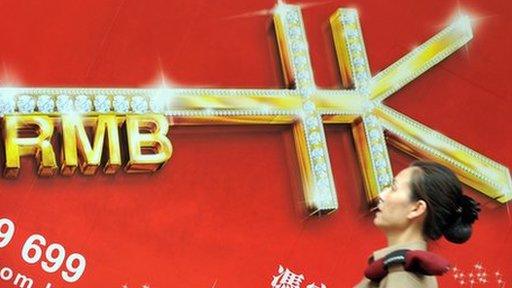
But doesn't China want to keep tight control of its currency?
The new generation of leaders, who took the reins at the end of 2012, have made it clear that they want to reform China's financial system, and as part of this want to make it easier for China to invest abroad and for China to receive foreign investment.
"This announcement is symbolic of their new intentions. China's government is making it clear that it's open for business," says Mr Derrick.
Enabling direct foreign-exchange market deals between the renminbi and the British pound should increase bilateral trade.
This says Mr Derrick will allow Chinese markets to become more balanced, potentially ironing out local bubbles which exist in parts of China's property market.
Beng-Hong Lee, head of markets, China for Deutsche Bank, says being able to directly trade sterling and renminbi will improve transparency, and "help lay the foundation for the use of the renminbi as a new global currency".
And having a global currency will make it easier for China to both export and import, with more countries willing to accept renminbi-denominated deals.
Mr Derrick suggests a further underlying reason is to remove the exchange risk with the US dollar, saying China could be concerned that the Federal Reserve's printing of money to stimulate growth could devalue the dollar.
"It wants people in China to feel comfortable their currency won't be devalued," he says.

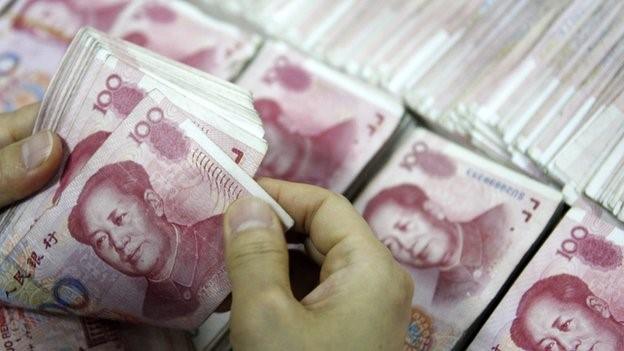
Should we really be talking about the renminbi, isn't it the yuan?
Actually, both names are perfectly good, but in slightly different ways.
"Renminbi" is the official name of the currency introduced by the Communist People's Republic of China at the time of its foundation in 1949. It means "the people's currency".
"Yuan" is the name of a unit of the renminbi currency. Something may cost one yuan or 10 yuan. It would not be correct to say that it cost 10 renminbi.
An analogy can be drawn with "pound sterling" (the official name of the British currency) and "pound" - a denomination of the pound sterling. Something may cost £1 or £10. It would not be correct to say that it cost 10 sterling.